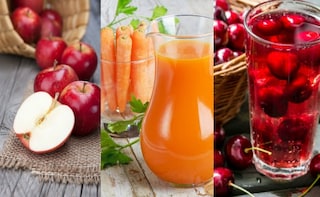World Cancer Day' is celebrated annually on 4th of February to deepen our understanding of this killer disease. There has been enough research to validate that food acts as the most promising ammunition to fight the battle against cancer. We bring to you six common queries that are addressed by Dr Ashutosh Gautam, Clinical Operations and Coordination Manager, Baidyanath.
- Genetics: Certain cancers run in families. For example, certain mutations in the BRCA1 or BRCA2 genes greatly increase a person's risk of developing breast and ovarian cancer.Advertisement
- Smoking: Cigarette smoking accounts for around 30% of all cancer deaths. It is linked with increased risk of these cancers - lungs, larynx, oral cavity, nose and sinuses, esophagus, stomach, pancreas, cervix, kidney, bladder, ovary, colon, rectum and acute myeloid leukemia. Chewing of tobacco, a carcinogen, is linked to dental caries, gingivitis, oral leukoplakia, and oral cancer.
- Diet and Lifestyle: Research shows that a poor diet and not having an active lifestyle are the key factors that can increase a person's risk of developing cancer.
Advertisement
Advertisement
- Processed meats such as bacon, sausages, lunch meats and hot dogs.
- Choose fish, poultry, or beans instead of red meat (beef, pork, and lamb).
- If you eat red meat, choose lean cuts and eat smaller portions.
- Prepare meat, poultry, and fish by baking, broiling, or poaching rather than by frying or charbroiling.Advertisement
- Bisphenol A(BPA) can be found in reusable plastic food containers and the lining of food and beverage cans. Research shows that BPA exposure is linked to breast cancer, and has been shown to interfere with chemotherapy treatment for the disease.
- Phthalates can be found in some plastic food containers and are considered as endocrine disruptors. Phthalate exposure has been linked to early puberty in girls, a risk factor for later-life breast cancer.
- Some pesticides and herbicides used on foods we eat have been labeled as human or animal carcinogens.
- Zeranol: Commonly found in the beef industry processing, it mimics an estrogen like action in the body and has been found carcinogenic in laboratory animals. This chemical is banned by the European Union.
- Polyvinyl chloride (PVC) is used to produce food packaging. It was one of the first chemicals designated as known human carcinogen and has been linked to increased mortality from breast cancer and liver cancer among workers involved in its manufacture.
- Include fibers in your diet for healthy bowel movements. Regular bowels are important for detoxification.
- Regular exercise is most important to boost immunity and avoid metabolic disorders like diabetes, hyper cholesterol, obesity, thyroid, hypertension etc. Yoga, paranyam are good for reducing stress, improving flexibility and correcting posture.
- Nuts provides a good source of energy and other nutrients which are helpful. They help in the reduction and maintainence of weight. Nuts are advisable for controlling bad cholesterol. Nuts like walnut, almonds and pistachios are good for diabetics, hypercholesterolemia.
- Intake of fruits and vegetables provides necessary antioxidants, vitamins, and minerals. These help to neutralize the oxidative stress in the body and avoid damages to DNA, ageing.
- Regular detox through green and herbal teas helps to maintain the balance in the body. Spa and Ayurveda therapies like body massages, shirodhara, chooran svedanam help to relax the body and mind. Lymphatic drainage therapy is also helpful to cleanse channels and get rid of toxins from the lymphatic system.
For the latest food news, health tips and recipes, like us on Facebook or follow us on Twitter and YouTube.
Advertisement
